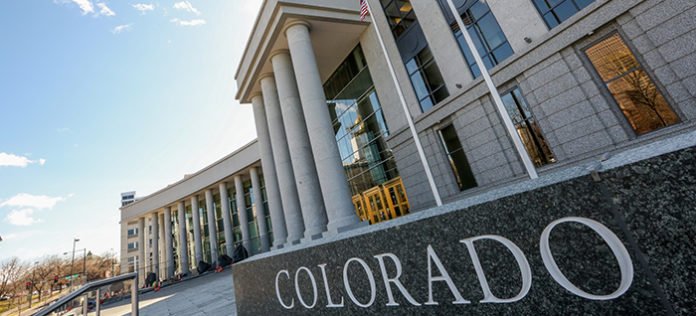
The Colorado Supreme Court again has cleared a path for a ballot measure to repeal the entire Taxpayer’s Bill of Rights, the controversial state Constitutional amendment that limits the state and local governments’ authority to raise taxes.
In the Dec. 23 decision, the court said the repeal measure’s title and abstract are clear and not misleading. Analysis of the title and abstract mirrored a decision from June, when the Supreme Court decided the measure meets the state Constitution’s single-subject requirement for ballot questions. That decision reversed the Title Board’s decision.
The title ultimately set by the board says, “An amendment to the Colorado constitution concerning the repeal of the Taxpayer’s Bill of Rights (TABOR), Article X, Section 20 of the Colorado constitution.”
“The initiative could not be written more simply or directly,” wrote Justice Richard Gabriel in the June decision. “It essentially asks voters a single question: should TABOR be repealed in full?”
In the latest decision, In re Proposed Ballot Initiative 2019-2020 #3, Gabriel wrote the title allows voters to make an informed decision about whether to support the repeal measure. “Moreover, we cannot discern how voters could be confused by this title or how the effect of a yes/for or no/against vote would be unclear,” he wrote. The appeal was brought to the Supreme Court by Doug Bruce – TABOR’s polarizing author – and William Banta.
Bruce and Banta argued the measure doesn’t meet the clear title requirement because it doesn’t list the features of TABOR the measure would repeal.
But the majority opinion didn’t accept that argument. Gabriel wrote the Title Board doesn’t have to include a description of every component of the repeal, and he added “listing in the title a substantial number of TABOR’s provisions, as Bruce and Banta request, would make the title excessively long and difficult to read, and it likely would confuse rather than assist
voters.”
But as the majority’s analysis mirrored its decision from last summer, so did the philosophical divide in the court. Justice Monica Márquez wrote a partial dissent – joined by Justice Brian Boatright – to the decision about the title’s clarity, reasoning that the measure doesn’t meet the single-subject requirement because TABOR itself has several components. TABOR is perhaps best-known for requiring voter approval for the state or a local government to raise taxes. But the constitutional amendment has other distinct elements, including wording requirements for tax increases or new taxes.
Márquez added aside from the single-subject requirement, the title doesn’t include any ‘central features’ of the repeal measure.
“Yet even putting aside the single subject problem discussed above, the title blessed by the majority today fails to satisfy the clear title requirement because it does nothing to inform voters what TABOR is or describe the ‘rights’ that would be repealed,” she wrote. Márquez argued the title doesn’t give laypeople enough information about the measure to make an intelligent decision whether to
support it.
In addition to the title and summary’s clarity, the Supreme Court also addressed Bruce and Banta’s argument that the use of “Taxpayer’s Bill of Rights” in the ballot title is an “impermissible catch phrase.” The decision said a phrase is acceptable when it is descriptive and doesn’t create false assumptions about a ballot measure’s effects that could influence voting decisions. The TABOR repeal measure meets those requirements, said the court.
As an example of an “impermissible catch phrase,” Gabriel pointed to a past ballot measure requiring public school students in the state to be taught in English, which said the measure would teach non-English-speaking students the language “as rapidly and effectively as possible.”
Whether English immersion was the most rapid and effective way to teach the language was the heart of the policy debate, so the court ruled the language could influence voters’ assumptions about the measure.
“The phrase ‘Taxpayer’s Bill of Rights’ is not ‘emotionally laden’ or suggestive of comparisons to the federal Bill of Rights,” Gabriel wrote. Márquez agreed with that part of the majority’s decision.
She also agreed with the final analysis of the repeal measure’s abstract, which the court ruled is clear and not misleading. Part of it reads:
“The measure is expected to increase revenue and spending for state and local governments over the long term, shifting a portion of the state’s economy from the private sector to the public sector. Government spending for public goods and services, including for example health care, education, social services, infrastructure and public safety, will increase. Household and business spending or saving will be correspondingly reduced.”
The initiative’s challengers argued that part of the summary misleads because speculates about the initiative’s economic impact. According to their argument, Gabriel wrote, the economic impact depends on uncertain future fiscal policy decisions.
But Gabriel said the majority didn’t agree with the argument because although the Title Board does have to create an initial estimate of a measure’s fiscal impact, its summary doesn’t have to contain hard numbers if detailed estimates aren’t possible. “when the legislative council cannot provide quantitative estimates [of a measure’s fiscal impact], indeterminate qualitative impact statements are permissible.”
—Julia Cardi

